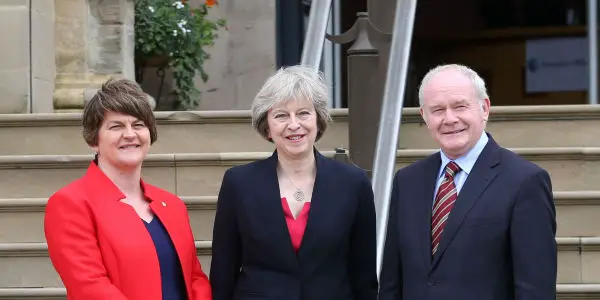Prime Minister Theresa May has pledged to find a “practical solution” to managing the Irish border following Brexit, insisting nobody wanted a return to barriers and check-points of the past.
Mrs May said she recognised the particular circumstance presented by Northern Ireland’s land border with the Republic of Ireland – an EU member state – after she held talks with the region’s political leaders at Stormont Castle, Belfast.
“Nobody wants to return to the borders of the past,” she said.
“What we do want to do is to find a way through this that is going to work and deliver a practical solution for everybody – as part of the work that we are doing to ensure that we make a success of the United Kingdom leaving the European Union – and that we come out of this with a deal which is in the best interests of the whole of the United Kingdom.”
The Prime Minister heard contrasting views on the way forward post-referendum from Brexit-backing First Minister Arlene Foster and Remain-supporting Deputy First Minister Martin McGuinness as they discussed the fall-out in a region where the majority (56%) voted for the UK to stay in the EU.
Democratic Unionist Mrs Foster said she welcomed Mrs May’s pledge to fully consult with the Stormont Executive on the negotiations with the EU, but Sinn Fein’s Mr McGuinness said he told her Brexit brought “no good news whatsoever” and the outcome of the vote in Northern Ireland had to be respected.
Campaigning for a Remain vote on a visit to Northern Ireland before June’s historic vote, Mrs May said it would be inconceivable, in the event of a decision to Leave, that there would not be changes to the current arrangements that allow free movement of goods, trade and services across the border.
A month on, on her first engagement in the region as Prime Minister, she was asked whether a hardening of the border was now inevitable.
Mrs May noted that the Common Travel Area (CTA) agreement between the UK and Irish Republic, which enables people to move unrestricted across the island, pre-dated the creation of the EU.
While the accord dates back to the 1920s, it has never been in operation when one country was inside the EU and one was not – as both the UK and Ireland joined the European Community at the same time in early 1970s.
Mrs May characterised her discussions with Mrs Foster and Mr McGuinness as “very constructive … positive”. She held a joint meeting with both leaders before breaking off for one-to one talks with each individually.
Afterwards, the Prime Minister repeated her vow, made on the steps of Downing Street moments after becoming PM on July 13, that she would govern “for the whole of the United Kingdom – of which Northern Ireland is a valued part”.
“Brexit means Brexit, but we will be making a success of it and I am clear that the Northern Ireland Executive and the other devolved governments will be involved in our discussions as we set forward the UK position,” she added.
“I recognise there’s a particular circumstance in Northern Ireland because, of course, it has a land border with a country, the Republic of Ireland, that will be remaining in the EU.
“We’ve had constructive talks about the will that we all have to find a way through this which is in the best interests of Northern Ireland and the best interest of the United Kingdom as a whole.”
Mrs May made her remarks during a brief media appearance after the meetings. Only one pre-agreed question from the press was permitted by officials from No 10. That question related to the border.
The UK-wide vote to Leave has triggered intense political wrangling in Northern Ireland, where the majority wanted to stay.
The result has sparked a renewed debate on a potential referendum on Irish reunification with the Republic of Ireland. Mrs May’s visit coincided with news that a cross-community group of Northern Ireland politicians and human-rights activists are to launch a legal challenge against Brexit.
Following the Prime Minister’s departure from Stormont Castle, the divisions within the powersharing administration on the matter were laid bare as Mrs Foster and Mr McGuinness gave contrasting assessments of the meetings.
DUP leader Mrs Foster welcomed the prospect of a UK-wide ministerial committee being established to focus on the EU exit.
She added: “I am delighted that she is here in Northern Ireland recognising the importance of Northern Ireland as a strategic part of the United Kingdom and we look forward to feeding in the particular circumstances of Northern Ireland into the process that has now begun.”
Mr McGuinness struck a very different note.
“There is absolutely no good news whatsoever about Brexit,” he said.
“There are no good opportunities flowing from Brexit and I made it clear to the British Prime Minister that the democratically expressed wishes of the people of the North, who see their future in Europe, who voted to remain in Europe, should be respected.”
Mr McGuinness said there were many issues on which he and Mrs Foster agreed.
But he added: “On the issue of Brexit I speak for the people of the North, and the people of the North, who are unionist, nationalist and republicans have made it clear that they see their future in Europe.”
Mrs Foster responded: “We all know there was an election in May of this year (Assembly election) and the Democratic Unionist Party, as a result of that, has 38 members and he has 28 members. So I think we jointly speak for the people of Northern Ireland. I speak for the unionist majority and he speaks for the nationalist majority but together we should be looking to achieve what’s best for all the people of Northern Ireland and not try to make political points scoring out of what has occurred.”
